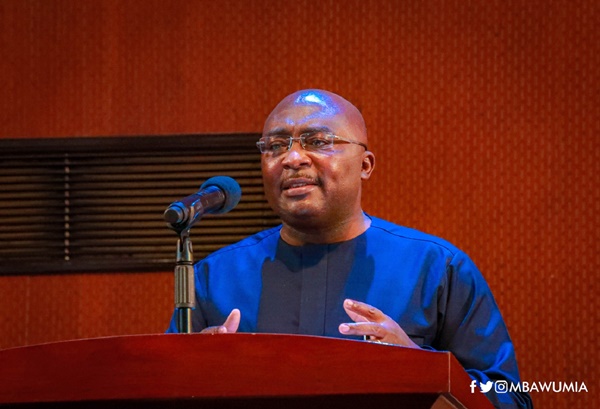Go into entrepreneurship – Bawumia to graduates
Employment opportunities still exist in the public sector for graduates, the Vice-President, Dr Mahamudu Bawumia has said.
However, he has advised graduates to venture into entrepreneurship, where they can develop their own businesses to enable them to build a sound future for themselves and also contribute to the development of the country.
Dr Bawumia gave the advice in a speech read on his behalf by a Deputy Minister of Education, Rev. John Ntim Fordjour, at the 13th congregation of the University of Mines And Technology (UMaT) in Tarkwa last Saturday.
While saying the public sector would not shut its doors to graduates, the Vice-President said it was important for them to know that there was much to gain from setting up their own businesses.
“Not only are you expected to be working in the public sector; you are equally expected to be drivers of the private sector. Some of you should start planning to begin your own businesses with knowledge gained from the training you have received, and possibly employ others,” he said.
Skills not grades
The role of the new graduates in the private sector, he said, would be instrumental to the growth of the country, and reminded them that as fresh graduates, they should know that grades and academic scores might not matter after school.
“You should develop such positive traits as hard work, honesty, dedication, trustworthiness and humility,” he told them.
He further told them that as they stepped out into the world of work, they should take advantage of all opportunities that would come their way and position themselves to be relevant to society.
Leadership
As a government, he said, “we have absolute confidence in the current leadership of the university to spur the needed efforts for the development of the university”.
Dr Bawumia said aside from the UMaT’s immense contribution to Mining, Petroleum and related engineering education in the country, the university had lived up to its core mandate of training mining engineers for Ghana and the world at large.
He said it was heartwarming that UMaT graduates served in various distinguished capacities in the mining and allied industries all over the world.
He said it was heartwarming that the university was promoting sustainable artisanal and small-scale mining through various engagements with stakeholders, especially small-scale miners, which would help protect the environment and water bodies.
The government, he said, was in support of such moves because they presented a direct link to the President’s vision on the fight against illegal mining in the country.
Impact of Free-SHS
On increased enrolment in the university, Dr Bawumia said the government was aware of the impact of the introduction of free SHS education on tertiary educational institutions, such as the UMaT.
“The UMaT has to deal with the surge in enrolment and the attendant challenges. Through the relevant ministries and agencies, the government will continue to address infrastructural and logistic challenges that the university faces,” he said.
Strides
The Vice-Chancellor of the UMaT, Prof. Richard Kwasi Amankwah, said the university had taken some major steps to maintain its position among forward-looking universities.
He said total student population in the UMaT stood at 3,529, and that in the 2020/2021 academic year, total fresh students admitted to pursue various programmes were 1,492, representing an increase of 76 per cent over the previous year’s enrolment.
“We intend to increase student enrolment to about 8,000 in the next few years, all at the back of President Nana Addo Dankwa Akufo-Addo accepting to build a Lecture Theatre Complex to support this venture.
“The UMaT intends to grow the technology mindset and adventure spirit of students and sharpen their problem identification and solving skills. The university has introduced new courses, such as Critical Thinking and Integrated Thought, Financial Literacy and Leadership,” he said.
New programmes
The university, he said, was ready to run several new programmes, and that if approval was given, some postgraduate programmes that would be mounted beginning from the next academic year included postgraduate certificate programmes in Mining, Gold Extraction Technology, Extractives Sustainability Management and Resource Value Chain Management.
Those, Prof. Amankwah said, would allow social scientists, accountants, auditors and other such professionals in the minerals industry to learn about mining and acquire degrees in the subject.
Extension of influence
“University-wide research has been aligned to the Sustainable Development Goals in response to the global call to ensure social, economic and environmental sustainability,” he said, adding that through that, the UMaT was extending its circle of influence by helping to achieve some of the goals.
This year, Prof. Amankwah said, the university set up the Institutional Advancement Division to strengthen its engagements and partnerships, adding: “The division operates two hubs — the sustainable small-scale mining hub and the emergency and disaster management hub.”
Graduating students
This year, 684 students graduated at various levels. Out of these, three were awarded Doctor of Philosophy degrees, 28 received master’s degrees, while 603 were awarded Bachelor of Science degrees in their respective engineering programmes.
A total of 126 students, representing 21 per cent of the graduating class, obtained First Class honours, while 61 per cent obtained Second Class (Upper Division), with 17 per cent getting Second Class (Lower Division) and one per cent with passes.
Fifty of the graduands received diplomas and certificates.



